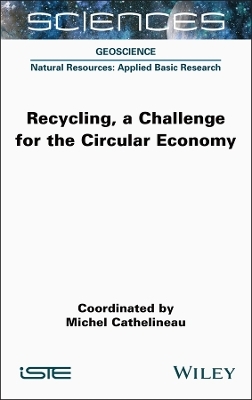
Recycling, a Challenge for the Circular Economy
Iste Ltd (Verlag)
978-1-78945-162-7 (ISBN)
- Noch nicht erschienen (ca. Januar 2025)
- Versandkostenfrei
- Auch auf Rechnung
- Artikel merken
Recycling, a Challenge for the Circular Economy begins its analysis by raising awareness of the role of each of us in reducing the volume of individual waste. The book then outlines the strategies and challenges involved in recycling a wide range of materials, from minimally processed (wood, glass, building materials or polluted soil) to highly processed (electrical and electronic waste, batteries, magnets or plastics).
Aspects of resource availability are also discussed, as well as ways of addressing the dynamic cycle of materials in the context of ever-increasing demand.
Michel Cathelineau is Director of Research at the CNRS, France, and is heavily involved in the activities of the ICEEL Carnot Institute and the Strategic Metals in the 21st Century (Ressources21) laboratory of excellence.
Introduction xiii
Michel CATHELINEAU and Alexandre CHAGNES
Chapter 1. Waste Prevention 1
Eddy LANGLOIS
1.1. Introduction 1
1.2. Facts 2
1.3. Solutions 9
1.4. References 15
Chapter 2. Primary and Secondary Resources for Energy and Digital Transitions 17
Michel CATHELINEAU
2.1. The great industrial booms related to the type of energy and the subsequent changes in the use of resources 17
2.2. Metals employed by the industry: rare, strategic and critical metals, rare earths, etc. 23
2.3. Available reserves and resources: metal reserves 25
2.4. Metals of energy and digital transitions 27
2.5. An uncertain future: the relative share of primary and secondary resources 32
2.6. Metal recycling. 39
2.7. References 41
Chapter 3. Recycling and Business Model(s) in the Circular Economy 45
Sébastien LIARTE
3.1. The role of recycling in the transition from the linear economy to the circular economy 46
3.2. Encouraging companies to "close the loop" through recycling 49
3.3. In search of a business model for the circular economy, in general, and for recycling, in particular 51
3.4. Electric car batteries 54
3.5. Conclusion 57
3.6. References 58
Chapter 4. Hydrometallurgical Recycling of Energy Transition Materials 61
Alexandre CHAGNES
4.1. Introduction 61
4.2. The main unit operations of hydrometallurgical processes 63
4.3. Implementation of hydrometallurgical processes in recycling 72
4.4. Conclusion 83
4.5. References 84
Chapter 5. Recovery and Recycling of Metals from WEEE 87
Pauline GAMBS, Marie LEPAGE and Hervé MUHR
5.1. Introduction 87
5.2. Definition and context 88
5.3. The future of (W)EEE 99
5.4. An urban mine 109
5.5. The example of the cellphone 115
5.6. Conclusion 122
5.7. References 123
Chapter 6. Recycling of Printed Circuit Boards 125
Benoît VILLEMEJEANNE and Sophie LEGEAI
6.1. Introduction 125
6.2. PCBs, a mine of rare and precious metals 126
6.3. The treatment of PCBs 133
6.4. Conclusion 145
6.5. References 147
Chapter 7. Polymer Recycling by Open Source Additive Manufacturing 151
Fabio CRUZ SANCHEZ, Hakim BOUDAOUD, Sandrine HOPPE and Mauricio CAMARGO
7.1. Introduction 152
7.2. Theoretical context 152
7.3. Recycling in AM 159
7.4. Proposal of methodology to evaluate the recyclability potential of polymers for AM 162
7.5. Case study: recycling of PLA for FFF 3D printing 165
7.6. Results 172
7.7. Conclusion 176
7.8. References 176
Chapter 8. Holistic Assessment of Distributed Recycling for Open Source 3D Printing 183
Pavlo SANTANDER TAPIA, Fabio CRUZ SANCHEZ, Hakim BOUDAOUD and Mauricio CAMARGO
8.1. Introduction 184
8.2. State of the art 186
8.3. Methodological proposal 188
8.4. Development and application of models to the research platform LF2L 191
8.5. Conclusion 205
8.6. References 208
Chapter 9. Cascading Recycling of Wood Waste 211
Nicolas BROSSE, Arnaud BESSERER, Sarah TROILO, Pierre GIRODS, Lucas SOUFFLET and Yann ROGAUME
9.1. Introduction 212
9.2. State of the art, deposits 213
9.3. Sorting 218
9.4. Panel industry, MDF (current methods) 219
9.5. Ongoing research and innovations 221
9.6. Conclusion 233
9.7. References 234
Chapter 10. Recycling and Recovery of Glass Material 237
Christophe RAPIN, Eléonore DURAND and Marie-Alice SKAPER
10.1. Introduction 238
10.2. Definition - overview 239
10.3. General data on recycling 245
10.4. Various causes of problems depending on waste sources 256
10.5. Conclusion 262
10.6. References 263
Chapter 11. Agromining, A Method for Recovering Metals from Soil 265
Marie-Odile SIMONNOT, Baptiste LAUBIE, Jean Louis MOREL and Guillaume ECHEVARRIA
11.1. Introduction 265
11.2. Metal-bearing soils 268
11.3. Hyperaccumulator plants 271
11.4. Metal recovery from biomass 273
11.5. Environmental impacts of agromining 276
11.6. Conclusion 277
11.7. References 278
Chapter 12. Recycling of Construction Components and Corresponding Sectors 281
Jean-Michel MECHLING, Cécile DILIBERTO, Sandrine BRAYMAND and Essia BELHAJ
12.1. Introduction 281
12.2. What construction materials are effectively recyclable? What are their properties? 285
12.3. What are the recyclable industrial coproducts for construction? 290
12.4. Valorization in civil engineering materials 293
12.5. Conclusion: drivers and barriers to recycling and recovery 307
12.6. References 309
List of Authors 317
Index 321
| Erscheint lt. Verlag | 19.1.2025 |
|---|---|
| Reihe/Serie | ISTE Consignment |
| Verlagsort | London |
| Sprache | englisch |
| Themenwelt | Naturwissenschaften ► Biologie ► Ökologie / Naturschutz |
| ISBN-10 | 1-78945-162-0 / 1789451620 |
| ISBN-13 | 978-1-78945-162-7 / 9781789451627 |
| Zustand | Neuware |
| Haben Sie eine Frage zum Produkt? |
aus dem Bereich


